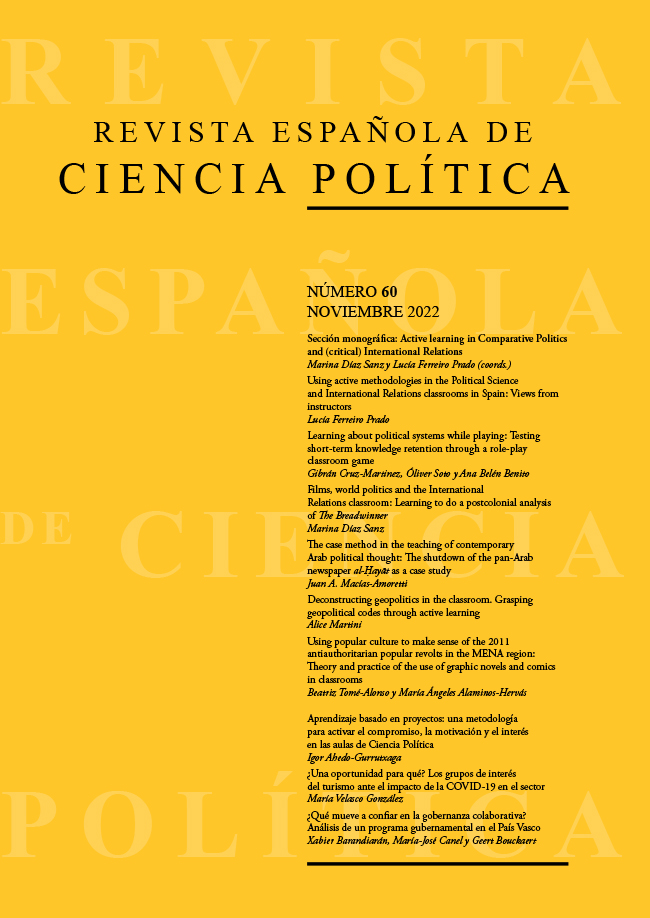American affective polarization in comparative perspective / Noam Gidron, James Adams y Will Horne. Cambridge: Cambridge University Press, 2020, 86 pp.
Downloads
References
Banda, Kevin K. y John Cluverius. 2018. «Elite polarization, party extremity, and affective polarization», Electoral Studies, 56: 90-101. Disponible en: https://doi.org/10.1016/j.electstud.2018.09.009.
Bankert, Alexa. 2021. «Negative and positive partisanship in the 2016 US presidential elections», Political Behavior, 43: 1467-1485. Disponible en: https://doi.org/ 10.1007/s11109-020-09599-1.
Boxell, Levi, Matthew Gentzkow y Jesse M. Shapiro. 2020. Cross-country trends in affective polarization. National Bureau of Economic Research. Disponible en: https://www.nber.org/papers/w26669 (acceso: 1 de octubre de 2021).
Garret, R. Kelly, Shira D. Gvirsman, Bejamin K. Johnson, Yariv Tsfati, Rachel Neo y Aysenur Dal. 2014. «Implications of pro- and Counterattitudinal Information Exposure for Affective Polarization», Human Communication Research, 40 (3): 309-332. Disponible en: https://doi.org/10.1111/hcre.12028.
Gidengil, Elisabeth, Dietlind Stolle y Olivier Bergeron-Boutin. 2022. «The partisan nature of support for democratic backsliding: A comparative perspective», European Journal of Political Research, 61 (4): 901-929. Disponible en: https://doi.org/10.1111/1475-6765.12502.
Gill, Hyungjin. 2022. «Testing the Effect of Cross-cutting Exposure to Cable TV News on Affective Polarization: Evidence from the 2020 U.S. Presidential Election», Journal of Broadcasting and Electronic Media, 66 (2): 320-339. Disponible en: https://doi.org/10.1080/08838151.2022.2087653.
Iyengar, Shanto, Gaurav Sood y Yphtach Lelkes. 2012. «Affect, Not Ideology: A Social Identity Perspective on Polarization», Public Opinion Quarterly, 76 (3): 405-431. Disponible en: https://doi.org/10.1093/poq/nfs038.
Iyengar, Shanto, Lelkes Yphtach, Mathew Levendusky, Neil Malhotra y Sean J. Westwood. 2019. «The origins and consequences of affective polarization in the United States», Annual Review of Political Science, 22: 129-246. Disponible en: https://doi.org/10.1146/annurev-polisci-051117-073034.
Kingzette, Jon, James N. Druckman, Samara Klar, Yanna Krupinkov, Matthew Levendusky y John B. Ryan. 2021. «How Affective Polarization Undermines Support for Democratic Norms», Public Opinion Quarterly, 85 (2): 663-677. Disponible en: https://doi.org/10.1093/poq/nfab029.
Levendusky, Matthew S. y Dominik A. Stecula. 2021. We need to talk. How cross-party dialogue reduces affective polarization. Cambridge: Cambridge University Press. Disponible en: https://doi.org/10.1017/9781009042192.
Reiljan, Andres. 2020. «Fear and loathing across party lines (also) in Europe: affective polarization in European party systems», European Journal of Political Research, 59 (2): 376-396. Disponible en: https://doi.org/10.1111/1475-6765.12351.
Sunstein, Cass R. 2015. Partyism. University of Chicago Legal Forum. Disponible en: http://chicagounbound.uchicago.edu/uclf/vol2015/iss1/2 (acceso: 1 de octubre de 2021).
Törnberg, Petter. 2022. «How digital media drive affective polarization through partisan sorting», PNAS, 119 (42): e2207159119. Disponible en: https://doi.org/ 10.1073/pnas.2207159119.
Wagner, Marcus. 2021. «Affective polarization in multiparty systems», Electoral Studies, 69: 102199. Disponible en: https://doi.org/10.1016/j.electstud.2020.102199.
West, Emily A. y Shanto Iyengar. 2022. «Partisanship as a Social Identity: Implications for Polarization», Political Behavior, 44: 807-838. Disponible en: https://doi.org/10.1007/s11109-020-09637-y.
Published
How to Cite
Issue
Section
License
Copyright (c) 2022 José Miguel Rojo Martínez

This work is licensed under a Creative Commons Attribution-NonCommercial-NoDerivatives 4.0 International License.






